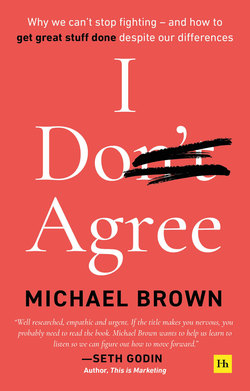Читать книгу I Don't Agree - Michael Brown - Страница 5
На сайте Литреса книга снята с продажи.
ОглавлениеPreface: A Guide to This Book
Did you know you’re likely to have had over 89,000 heated altercations with your closest relations before you reached the age of eight? By age 16, thousands more hours will have been spent by most of us in some form of disagreement with those in our extended social networks. As a species, we’re well-practised at falling out with each other.
We may even have a gene for it – certainly, some of us seem to be gifted.
When it comes to finding resolutions, however, things don’t come quite so naturally: as much as 90% of all interpersonal conflicts never reach agreement.
No wonder there’s so much aggro in the world.
Why is this problem so persistent? It turns out that disagreement often escalates when you try to sort it out: research has shown that people in dispute typically assume their own motivations are true and just – the deadlocks that prevent everyone moving forward are likely to be blamed on the other side by both sides – a phenomenon known as attribution bias.
World leaders falling out over tariffs on steel exports are hamstrung by the same problem as kids negotiating their claim to the last fried-egg Haribo in the family-sized pack.
Ultimately the issue is an inability to see things from the other side. But putting yourself in your opponent’s position puts another option on the table – the possibility of reaching a meaningful and honourable compromise.
If only compromise were not such a dirty word. There are many in business and politics who deride those prepared to reach for the middle ground as weak – lacking in vision, goals, ambition.
Meanwhile those who take a tough and uncompromising position are celebrated. But only when they win. Ask yourself this: if you needed to appoint someone to best represent your interests in a negotiation, what sort of qualities would you most like to see? Chances are you’d pick a tough, uncompromising candidate. As a result, you’re likely to be disappointed by the outcome.
The issue with what in business terms would be called a compromise agreement, is that all the players in the drama are never completely satisfied with the final position. Contrast that with a classic winner-takes-all binary argument: some people are ecstatic with the outcome and others are left in a pit of despair.
But what if there’s another option?
What if there actually was a way for people to firmly say ‘I don’t agree’ and yet ultimately still arrive at a genuine consensus? And what if this approach to conflict also gave people a way to get things done despite being in opposition?
Imagine a toolbox that allowed us to get on with solving problems while recognising our differences, whatever the argument, whatever the negotiation: from equality to the environment, from pay rises to promotion, from gender to geopolitics.
Well, that’s my hope for I Don’t Agree. As a business founder, a long-term managing director and someone inside the leadership group of an organisation of around 4,000 people, I understand the difficulties of trying to get everybody inspired by a vision. A lot of collaboration needs to happen, yet there’s so much that can get in the way. It’s not just the amount of practice we’ve had at falling out. Other hurdles to harmony include our genes, biology, Darwinism, (perhaps controversially) whether we are male or female, our emotions (particularly pride), where we were born, how many siblings we have, our values, our education system, our ideologies, even our propensity to smile.
I’m convinced, though, that harmony is achievable. And I’m going to prove it – and help your organisation get there. By the end of this book, I hope you’ll never think about organisational culture the same way again. I also want to assist anyone seeking to improve the culture inside any organised human endeavour: whether that’s a relationship with a partner, family, social group or within your community.
It’s my belief that flawed organisational culture fucks up the world.
And who is it that is responsible for culture? Yep. Us. The people inside it.
So we’ve got to sort it out. And with your help, I reckon it’s possible.
